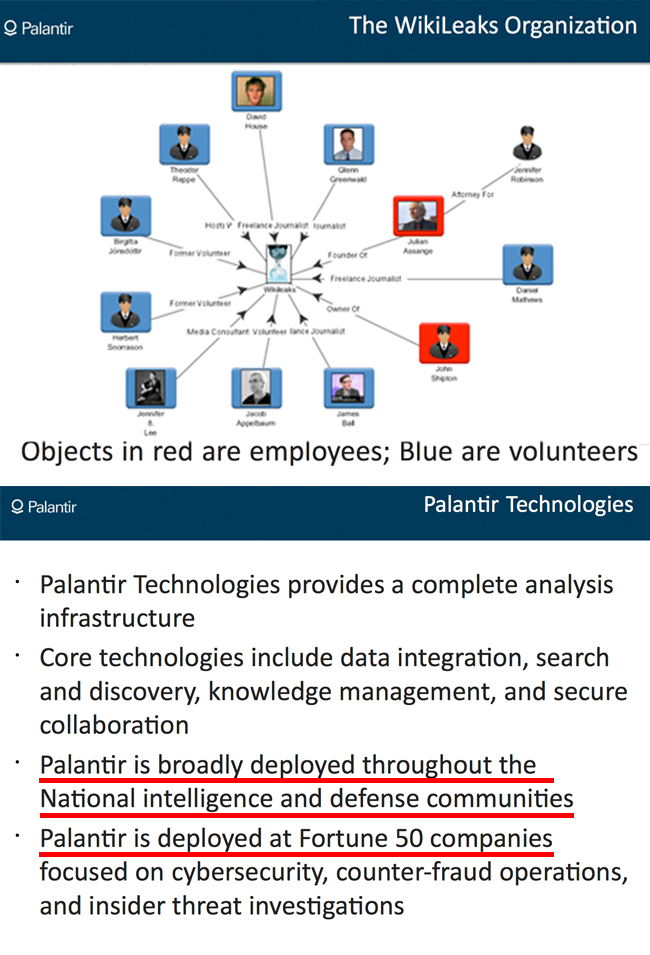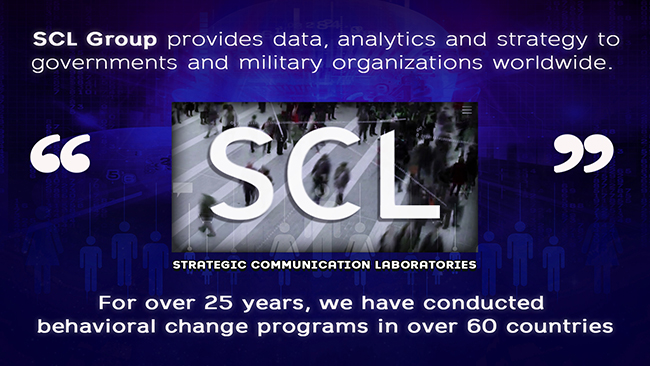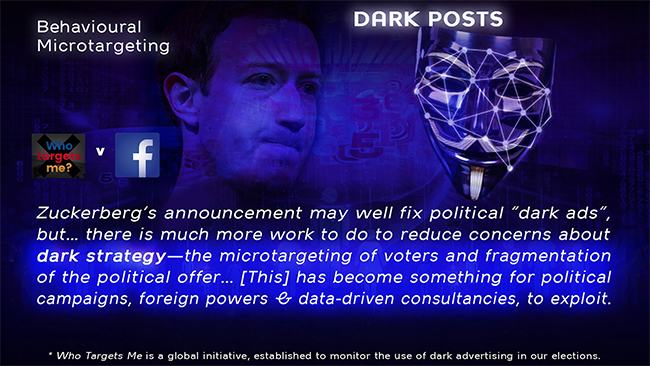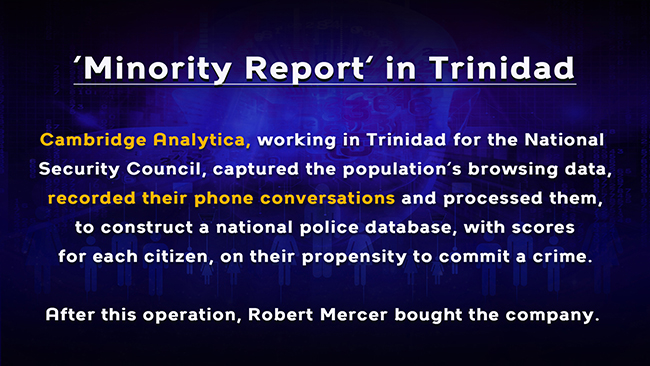In her October 2017 exposé on Cambridge Analytica, about 4 months before the appearance of its employee, Chris Wylie, Cathy Vogan drew our attention to the intelligence community’s growing involvement in election campaigns. Together with data-rich academics, they had been abandoning their government-appointed posts and ‘moving on up’ to the private sector. She then outlined how the ‘informed’ use of behavioural micro-targeting, big data & psychometrics by Cambridge Analytica got Donald Trump elected, and led to the leave vote for Brexit.
Vogan mentioned that SCL, the parent company of Cambridge Analytica is fondly known as “MI6 for Hire”. They have specialised in British government and military information operations for over 25 years, and until recently, mostly on other countries. She referred us to research
We have since learned that for the Crown Prince of Saudi Arabia’s reformer campaign, SCL created “a psychological road map of the kingdom’s citizenry and its sentiment toward the royal family”. That’s what the spooks associated with Team Trump & ALL the Brexit Leave campaigns do, and by their own admission, under a variety of shell company names. “We ghost in and ghost out”, they say, “without anyone knowing we were ever there”.
This sounds very much like the work Palantir Technologies does. In her 2014 article on Palantir,

A part of Palantir’s story was their involvement with HBGary Federal, a smaller agency that had allegedly been contracted, a few months after Cablegate, to destroy the reputation of Wikileaks and its supporters. The plan was also to ruin the career of the Guardian journalist, Glenn Greenwald, who had been writing favourable copy about Wikileaks; and who would go on to win a Pulitzer prize for his reporting on the Snowden revelations.
A document leaked by Anonymous from HBGary’s mail server stated:
“Together, Palantir Technologies, HBGary Federal, and Berico Technologies bring the expertise and approach needed to combat the WikiLeaks threat effectively.”

Palantir vs Wikileaks. The mission was to bring down the organisation.
Peter Thiel's other company, Paypal, blockaded Wikileaks funding world-wide.
Wired magazine reports back in February 2011, in an exciting account of the doxing of HBGary Federal by Anonymous, the intentions of their analyst, Aaron Barr, in collecting citizen data:
“I will sell it”
Writing for Wired, Nate Anderson from Ars Technica explains:
Barr had been interested in social media for quite some time, believing that the links it showed between people had enormous value when it came to mapping networks of hackers—and when hackers wanted to target their victims. He presented a talk to a closed Department of Justice conference earlier this year on “specific techniques that can be used to target, collect, and exploit targets with laser focus and with 100 percent success” through social media.
Barr’s claims of “laser focus” were bogus. The reason he got hacked was that he published a long list of names on cryptome.org (no to the actual link), of people he claimed were members of Anonymous, but the list included a lot of people who were not hackers. They were journalists, artists, musicians and writers, such as Nozomi Hayase, so the actual Anonymous got pretty angry… It came as a total surprise that the plot to destroy Wikileaks and harm both its supporters and a sympathetic journalist was buried in the mix. That was the scoop however that signalled the war on people-power had begun.

Nate Anderson continues:
“[Aaron Barr's] curiosity about teasing out the webs of connections between people grew. By scraping sites like Facebook or LinkedIn, Barr believed he could draw strong conclusions, such as determining which town someone lived in even if they didn’t provide that information. How? By looking at their friends.”
Does this sound familiar? Hardly surprising, when we learn of Palantir Technologies’ involvement in the Trump campaign, alongside Cambridge Analytica. There was even a third agency called Quid, but what of Wikileaks? Is it likely they would be playing ball with Palantir, and its co-founder Peter Thiel? He is also the founder of Paypal, who staged the world-wide blockade of Wikileaks funding. It’s hard to imagine.
“Assange characterised himself as the spy of and for the people: he is not spying on the people for those in power, he is spying on those in power for the people”.
Peter Thiel is also a board-member of Facebook, and was the site’s first major investor. He has harvested a mountain of citizen data, via Paypal and Palantir at least. It was an emissary from Palantir, Sophie Schmidt, daughter of the former Google CEO Eric Schmidt, who persuaded SCL that there was a lot of lucre to be made in analytics and election services. They formed SCL Elections. It was Steve Bannon who suggested they change the name to Cambridge Analytica.
Žižek offers an interesting perspective on the strict and prolonged silencing of Julian Assange. If his hunch is correct, Assange’s last significant announcement may have been that he would testify to the UK Parliament about Cambridge Analytica. Žižek writes:
“I think one name explains it all: Cambridge Analytica – a name which stands for all Assange is about, for what he fights against; the disclosure of the link between the great private corporations and government agencies…

Žižek continues:
“Remember what a big topic and obsession the Russian meddling in the US elections was – now we know it was not Russian hackers (with Assange) who nudged the people towards Trump, but instead the West’s own data-processing agencies which joined forces with political forces. This doesn’t mean that Russia and its allies are innocent: they probably did try to influence the outcome in the same way that the US does in other countries (only in this case, it is labeled “democracy promotion”). But it means the big bad wolf who distorts our democracy is not in the Kremlin, but walking around the West itself – and this is what Assange was claiming all along.”

As the Cambridge Analytica investigation unravels, it would seem that the Deep State has backed the wrong horse again in the Spooks vs Wikileaks stakes; even if Assange has been nobbled. The Favourite (of the CIA) promised supremacy over enlightened people-power, but such are the ways of the Palantiri Stone(r)s. The “cognitive military complex”, as Žižek calls it, has taken a blow to the pre-frontal from Wylie’s smoking guns. Public trust sinks as low as Facebook shares. Thinking back, we have reason to predict that Assange has more to say… Certainly Wikileaks has more to say, and we need to keep hearing it.

What we already know is that the hedge-fund billionaire, Robert Mercer, is the common factor between Cambridge Analytica, Trump, Bannon, AggregateIQ (his main analytics company for Brexit) and… Siri, for whom his algorithms were used. Siri, who knows our name and is always listening… We also know that Peter Thiel is the common factor between Cambridge Analytica, the CIA groomed Palantir Technologies and last but not least, Facebook.
Meanwhile, still in the red corner according to the hawks, is the Wikileaks-Russian tag team. Over there! Over there! Didn’t Zuckerberg do a sterling job of upgrading Russia’s interference in the US Elections during his testimony to Congress? One imagines “Arms Race” is exactly what both Parties wanted to hear.
Good boy. We know you’re sorry…
Žižek is troubled by what he calls “a well orchestrated character assassination” of the Wikileaks editor-in-chief, and cites gutter-level rumours that he is too smelly for the Ecuadorian Embassy. Žižek also refers to “a disgusting attack” on Assange from the Guardian – in the midst of extensive Cambridge Analytica coverage – which described him as a megalomaniac and a fugitive from justice. Žižek once again jogs our memory, and helps us join the dots:
“…as far they [the journalists] are concerned, write as much as you want about Cambridge Analytica and Steve Bannon, just don’t dwell on what Assange was drawing our attention to: that the state apparatuses which are now expected to investigate the “scandal” are themselves part of the problem.”
With news emerging that Theresa May was working with SCL as recently as February 2018, Slavoj Žižek may have a point; mighty heads could roll. Or, we could be rolled… back into the eternal sunshine of the spotless mind.
Cathy Vogan, on the black and white polarity of ‘Spooks vs Wikileaks’, and which future we need for the 21st Century:
![]()


